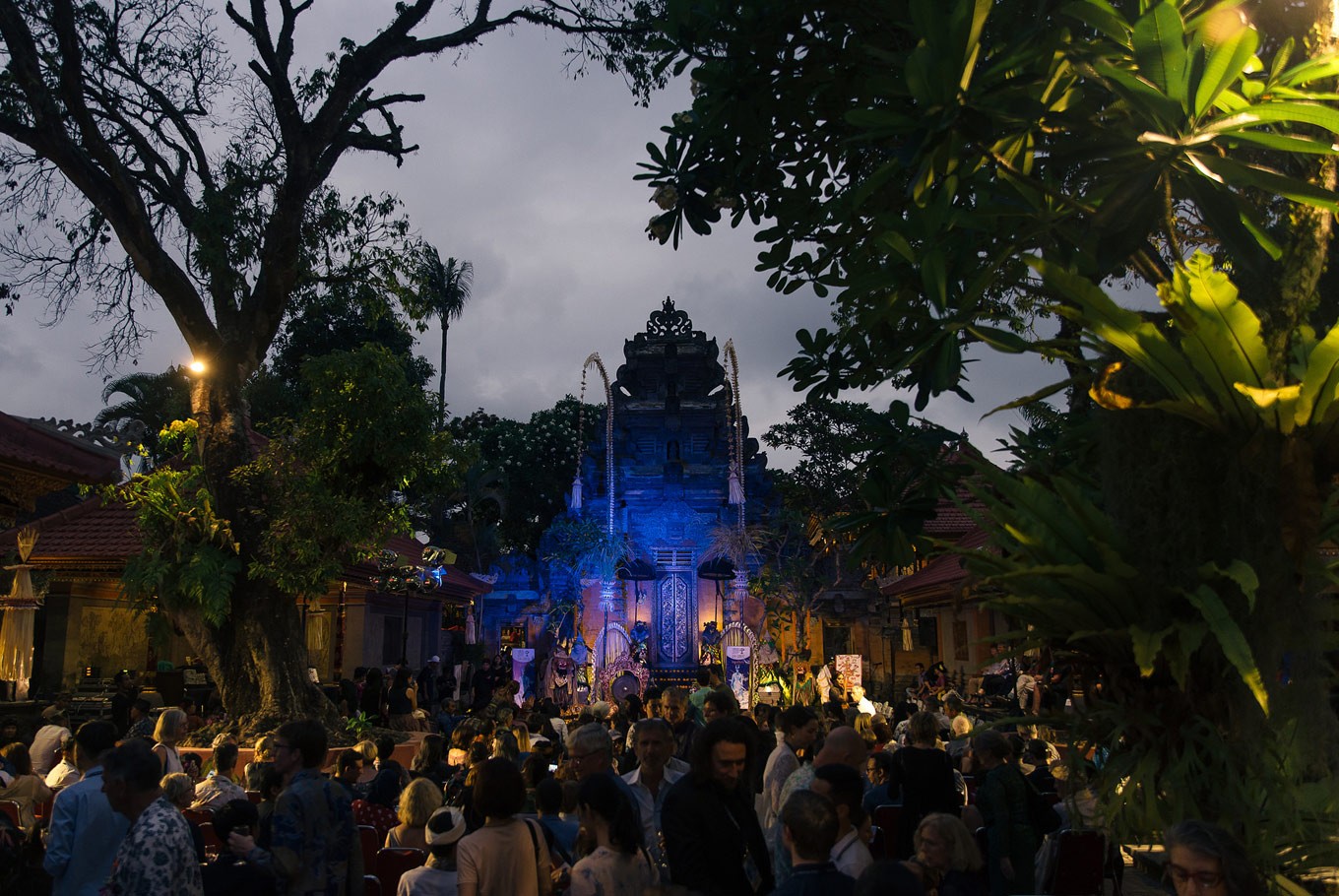Popular Reads
Top Results
Can't find what you're looking for?
View all search resultsPopular Reads
Top Results
Can't find what you're looking for?
View all search results2018 Ubud Writers and Readers Festival ends on high note, celebrates gender equality, diversity
Panel discussions and performances on Saturday and Sunday have shown that the Ubud Writers and Readers Festival has gradually transformed into a multidisciplinary art event.
Change text size
Gift Premium Articles
to Anyone
T
he 15th Ubud Writers and Readers Festival ended on a high note on Sunday night with founder and director Janet DeNeefe thanking patrons, writers and readers for their continuous support for the country’s longest-running international literary gathering.
“Without your support, we wouldn’t be able to stand where we are now. Thank you,” she said.
Held at the spacious and manicured lawn of the Blanco Renaissance Museum, the closing party was a jubilant affair highlighted with energetic musical performances from Celtic Room, Filastin & Nova and Sup K as well as a breathtaking video-mapping show.
Gaya Gaye, an Aceh-based music and dance group, performed a contemporary version of the famous traditional dance of Samna to a thunderous applause from the audience.
Earlier in the afternoon, in one of the last panels of the festival, DeNeefe and general manager Kaden Purnima talked about the challenges the festival had to overcome throughout the years, ranging from a lack of funding to the shifting demographic of literary lovers.
They also reiterated the festival’s commitment to serve as a platform that would allow the country’s emerging writers to gain international recognition.
Since 2008, the festival has flown in to Ubud more than 150 emerging writers from across the archipelago to speak alongside their more established international counterparts as well as translate and publish their works into an annual bilingual anthology. So far, the festival has published 11 anthologies.
“I believe the festival will keep growing in the future and it will not be solely a literary festival, but also a human rights and arts festival,” DeNeefe said.
Multidisciplinary event
Panel discussions and performances on Saturday and Sunday had shown that the festival has gradually transformed into a multidisciplinary art event.
In one such performance, Indian writer and dancer Tishani Doshi mesmerized spectators at the Betel Nut restaurant and art hub.
She moved her body gracefully while displaying a mournful face to the audience while a recording of her recitation of her poem “Girls Are Coming Out of the Woods” was broadcasted through loudspeakers.
Dashi danced along to the poem, which is dedicated to her friend and Indian perfumer Monika Ghurde, who was raped and murdered in 2016. The piece protests against gender-based violence.
The dance climaxed with Dashi covering her face as if being in despair but ended with a more uplifting tone as she displayed a warrior pose at the end of her dance as the final line of her poem was read: "girls are coming out of the woods, they are coming, they are coming".
The urgency for women and other marginalized groups to fight for their rights through literature and the arts was a salient theme on the final day of the festival.
Australian writer Clementine Ford discussed her book Boys Will be Boys: Power, Patriarchy and the Toxic Bonds of Mateship, which addresses how gender socialization turns men into emotionally numb individuals who have to resort to violence to express their masculinity.
She pointed out that many men who claimed to be feminists actually had blind spots when it came to admitting their own sexist biases. She urged for women to take a primary role in the fight against patriarchy.
"People used to say, ‘Oh, we need men as our allies.’ But we actually don't! In the suffragette movement in the West, did they ask the men to help them? No! These women even died while fighting for their right [to vote] and were successful in the end. Even today, many women still die every day fighting for their rights," Ford said passionately.
She urged men to let go of their defensiveness, pick up her book and discuss its content.
"Even if they don't agree with what I say, they should form book clubs on it. How many men actually form book clubs and start talking about issues openly?" she said.
Separately, Emmanuela Shinta, an environmentalist and writer from Kalimantan, talked about how she used documentary films to engage indigenous community youngsters in the fight against big companies that were destroying their land and livelihoods through slash-and-burn practices.
Concerns on 'Islamic radicalism'
Freedom for artists and writers, however, had recently been threatened by the rise of Islamic radicalism, some of the speakers said.
Balinese sculptor Nyoman Nuarta recounted in one session moderated by senior writer and journalist Leila S. Chudori how Muslim vigilantes demolished his statue in Bekasi, West Java.
"We already explained [to the statue protesters] what that statue symbolized in terms of the environment, but they refused to try to understand. We could not open up any discussions with them," Nyoman explained.
Leila also pointed out how, recently, vigilante groups dispersed literary and film discussions focusing on lesbian, gay, bisexual and transgender (LGBT) and 1965 communist purge issues, as the police stood idly by.
"We have to change how the [Police Law No. 28/1997] defines the task of the police. Currently, they define it as merely maintaining order, which they interpret as clamping down on the minority groups [to appease the vigilantes]. Instead, the law should define the police's task as defending the civil rights of every human in this country," Muslim activist Yenny Wahid said.
I Wayan Juniarta is a founding member of Mudra Swari Saraswati Foundation, which organizes UWRF.











